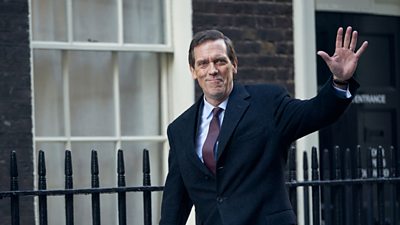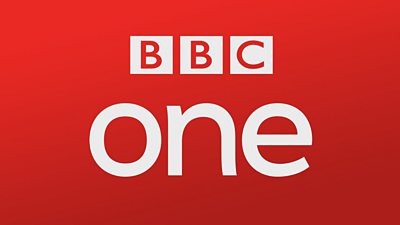Interview with Hugh Laurie
Hugh Laurie plays Peter Laurence in Roadkill.

Roadkill is a political drama about the price of success in the political realm, what it demands of the people who do it, and those around the person who does it. It’s pretty unforgiving.
Tell us about your role.
I play a character called Peter Laurence who is a Conservative cabinet minister. He begins the story at mid-cabinet level as Transport Secretary and has ambitions to move up the greasy pole. The story is in some regards about the price he is prepared to pay to get to the top position and the price that he forces everyone else to pay, principally his family, but also those who pledge their loyalty to him.
He is a man who is relatively free of the gravity of guilt and whose life mission is to keep moving forward and not to look back. It sounds as if the story is entirely about me - it isn’t. There are three or four different stories interlocking in different places with different hopes or dreams being realised or dashed.
Where do we meet Peter Laurence?
When we first join Peter Laurence he has just escaped the jaws of failure at the very least. He has taken the unusual step of suing a newspaper in a libel case, which is generally speaking something that politicians don’t do, or are not advised to do, and certainly the political establishment do not approve of them doing it. He’s a confident fellow and is confident in his ability to talk himself out of a jam.
Could you tell us about some of his key relationships?
He has a complicated life. His job demands a certain degree of loyalty to the Prime Minister, but he has a long and stable marriage to his wife Helen, played by Saskia Reeves, and they have a genuine fondness for each other and a genuine pride in their two daughters. They are childhood sweethearts and have taken quite a journey together. It subsequently turns out that Peter is also carrying on a liaison with another woman whose life was in a state of desperation until he extended a hand of friendship and support which turned into something romantic.
Then there’s Iain De Caestecker (Duncan) who is a very sharp lieutenant to have at Peter’s side. They are in it together. They aren’t quite like Butch and Sundance - there’s no gun play and no car chases!
Tell us about the script and David Hare’s writing.
It’s been enormously enjoyable to say David Hare’s words and also to work with the cast that’s been assembled for this. I wouldn’t be here without David Hare - he wrote what I think was the first film I was ever in, called Plenty. I think I had three lines but it meant spending a week in the company of Meryl Streep, and blimey! That was entirely because of his support and enthusiasm which I have tried to repay and failed.
David has a different way of looking at people and listening to people. Some of which has some of that jaggedness and awkwardness that I find so much more believable and intriguing.
How would you describe Roadkill, in a few sentences?
Roadkill is a political drama about the price of success in the political realm and what it demands of the people who do it, and those around the person who does it. It’s pretty unforgiving.
Introduction from David Hare
Please correct my maths if you can, but by my calculation I’ve lived almost 50 years under Tory rule.
Considering that they’ve formed our last six governments, it’s amazing how little fiction Conservatives have generated. There are a couple of good plays about Harold Macmillan, and during the 1980s there was a huge amount of satirical vituperation against Margaret Thatcher. At that time, I wrote a film called Paris By Night in which Charlotte Rampling played a Thatcherite MP. But I’m typical among the writers of my time in having rarely looked closely at the appeal of Conservative values.
In Roadkill, I wanted to ask what happens when you put ideals of freedom and personal responsibility above all other virtues. I was also interested in the effect of believing that every one of us is alone responsible for the destiny and progress of our own lives. But to inquire into these questions, it was essential to me to invent. I wanted to imagine what it would be like if a Conservative politician, naturally gifted with a mix of charm, intelligence, charisma and high humour, managed to find his path from a working-class household in Croydon right into the heart of Westminster.
So much television drama is now based on documentary events that it is hard to remember the primary trigger for fiction is meant to be the imagination. My hero, Peter Laurence, is not based on anyone. Nor are the other characters. Mine is a parallel world to the real one, and there is no secret passage between the two. You will be wasting your time if you think that the purpose of the series is to work out who everyone is ‘meant to be’. In Roadkill, neither Covid nor Brexit consume every politician’s waking hour.
The first series I wrote for television was Collateral, shown in 2018, with Carey Mulligan leading a wonderful cast. I found the four-part format excited me, because the challenge was to cram as much as I could into as short a space. I loved roaming freely throughout society, last time among illegal refugees and dodgy boat-runners, this time behind the scenes in women’s prisons as well as in Downing Street.
Such compacted epics depend for their vitality on high-octane actors. That’s why this time you will see Hugh Laurie, Helen McCrory, Saskia Reeves, Pippa Bennett-Warner, Sarah Greene and Olivia Vinall - among many other equally live wires - working their formidable magic. The tone of the series is controlled impeccably by the director, Michael Keillor. It was George Faber and Mark Pybus as producers at the Forge who first guided me when I wanted to learn a new skill so late in life. And it is they who have trusted me to try and repeat the trick.
Writing about the Tories has given me an immense amount of fun, and pushed me towards conclusions which I hope are unexpected. With luck, television drama won’t wait quite so long to put Conservatives under the microscope again.
David Hare
Cast and Production Credits
Cast Credits
Hugh Laurie - Peter Laurence
Helen McCrory - Dawn Ellison
Pippa Bennett-Warner – Rochelle Madeley
Danny Ashok - Luke Strand
Millie Brady - Lily Laurence
Shalom Brune-Franklin - Rose Dietl
Sarah Greene - Charmian Pepper
Olivia Vinall - Julia Blythe
Iain De Caestecker – Duncan Knock
Gbemisola Ikumelo - Steff Frost
Sidse Babett Knudsen - Madeleine Halle
Katie Leung - Margaret Moore
Ophelia Lovibond - Susan Laurence
Saskia Reeves - Helen Laurence
Pip Torrens - Joe Lapidus
Patricia Hodge - Lady Roche
Emma Cunniffe - Sydney
Production Credits
David Hare - Executive Producer and Screenwriter
Mark Pybus and George Faber - Executive Producers for The Forge
Michael Keillor - Director and Executive Producer
Andrew Litvin - Producer
Lucy Richer - Executive Producer for the ����ý
Rebecca Eaton - Executive Producer for Masterpiece
HW
